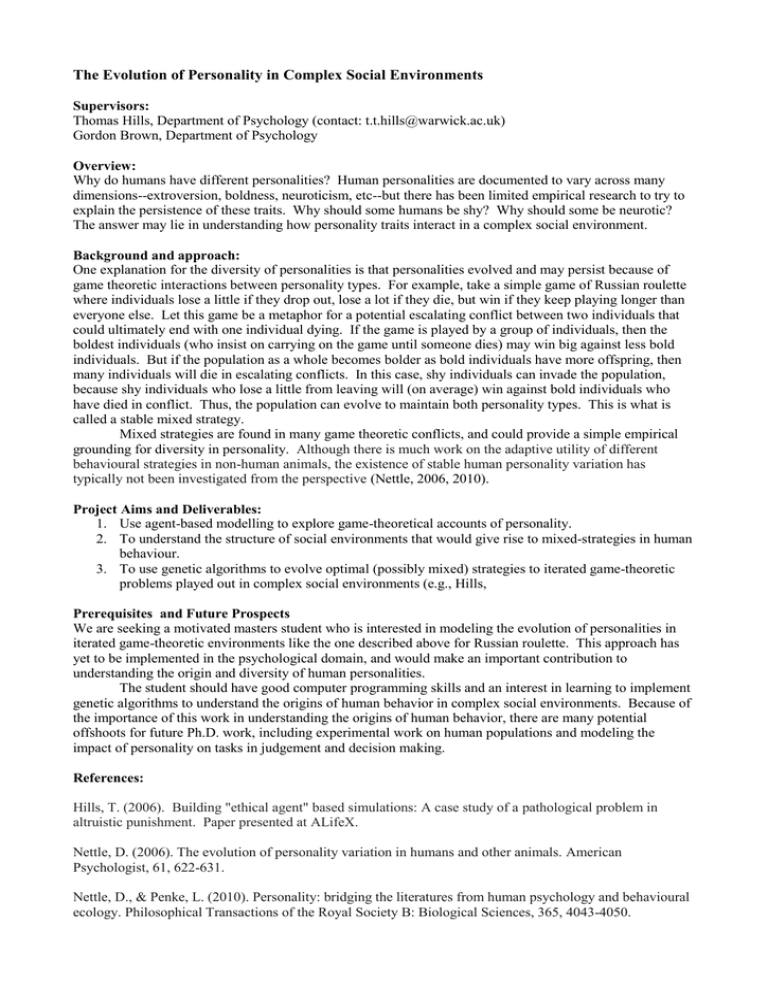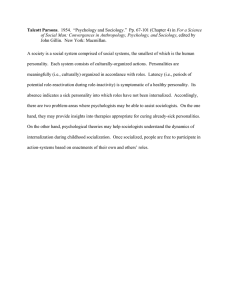The Evolution of Personality in Complex Social Environments
advertisement

The Evolution of Personality in Complex Social Environments Supervisors: Thomas Hills, Department of Psychology (contact: t.t.hills@warwick.ac.uk) Gordon Brown, Department of Psychology Overview: Why do humans have different personalities? Human personalities are documented to vary across many dimensions--extroversion, boldness, neuroticism, etc--but there has been limited empirical research to try to explain the persistence of these traits. Why should some humans be shy? Why should some be neurotic? The answer may lie in understanding how personality traits interact in a complex social environment. Background and approach: One explanation for the diversity of personalities is that personalities evolved and may persist because of game theoretic interactions between personality types. For example, take a simple game of Russian roulette where individuals lose a little if they drop out, lose a lot if they die, but win if they keep playing longer than everyone else. Let this game be a metaphor for a potential escalating conflict between two individuals that could ultimately end with one individual dying. If the game is played by a group of individuals, then the boldest individuals (who insist on carrying on the game until someone dies) may win big against less bold individuals. But if the population as a whole becomes bolder as bold individuals have more offspring, then many individuals will die in escalating conflicts. In this case, shy individuals can invade the population, because shy individuals who lose a little from leaving will (on average) win against bold individuals who have died in conflict. Thus, the population can evolve to maintain both personality types. This is what is called a stable mixed strategy. Mixed strategies are found in many game theoretic conflicts, and could provide a simple empirical grounding for diversity in personality. Although there is much work on the adaptive utility of different behavioural strategies in non-human animals, the existence of stable human personality variation has typically not been investigated from the perspective (Nettle, 2006, 2010). Project Aims and Deliverables: 1. Use agent-based modelling to explore game-theoretical accounts of personality. 2. To understand the structure of social environments that would give rise to mixed-strategies in human behaviour. 3. To use genetic algorithms to evolve optimal (possibly mixed) strategies to iterated game-theoretic problems played out in complex social environments (e.g., Hills, Prerequisites and Future Prospects We are seeking a motivated masters student who is interested in modeling the evolution of personalities in iterated game-theoretic environments like the one described above for Russian roulette. This approach has yet to be implemented in the psychological domain, and would make an important contribution to understanding the origin and diversity of human personalities. The student should have good computer programming skills and an interest in learning to implement genetic algorithms to understand the origins of human behavior in complex social environments. Because of the importance of this work in understanding the origins of human behavior, there are many potential offshoots for future Ph.D. work, including experimental work on human populations and modeling the impact of personality on tasks in judgement and decision making. References: Hills, T. (2006). Building "ethical agent" based simulations: A case study of a pathological problem in altruistic punishment. Paper presented at ALifeX. Nettle, D. (2006). The evolution of personality variation in humans and other animals. American Psychologist, 61, 622-631. Nettle, D., & Penke, L. (2010). Personality: bridging the literatures from human psychology and behavioural ecology. Philosophical Transactions of the Royal Society B: Biological Sciences, 365, 4043-4050.



